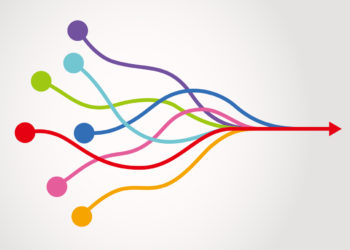Continuing our Kitchen Essentials series of interviews with leaders of infrastructure organizations, today we’re hearing from Tracey Armstrong, CEO of Copyright Clearance Center (CCC), the information solutions provider to organizations around the world.
Please tell us a bit about yourself — your role at CCC, how you got there, and why you embarked on a career in research infrastructure?
I have been President and Chief Executive Officer of CCC since 2007 and have spent my career working to develop market-based licensing solutions. On my career journey I followed engaging and challenging work where I had the opportunity to learn and to work with strong colleagues. I am intrinsically motivated with regard to the work I do and am very passionate about the power of direct and collective licensing.
What do you like most and least about working in research infrastructure?
What I enjoy most is collaborating with creative, committed stakeholders and collectively contributing to create solutions, minimize friction, and respect intellectual property, while positively impacting the world. I really appreciate that our market segment values continuous learning.
What I like least is entrenched positions. I do not think that everything must be one way or another. I prefer the research infrastructure garden where we let all flowers bloom, not just one business model. It is important to strive toward finding common ground to really move the research infrastructure segment forward and address systemic issues. For example, I see licensing as a facilitating tool. CCC understands the importance of supporting a functioning market for the application of AI by enabling the development of ethical, reliable, and trustworthy AI systems. We know how urgent it is to work with rightsholders to develop solutions that support the licensed use of copyrighted content in AI systems and that a variety of voluntary licenses, both direct and collective, will be effective at addressing this use. With regard to standards, there is more than one way for our industry to embrace and implement standards, persistent identifiers (PIDs), and accurate metadata to facilitate interoperability to enhance research workflows globally.
Based on your own experiences, what advice would you give someone starting, or thinking of starting, a career in research infrastructure?
I would advise anyone who is interested in intellectual challenges and working with incredibly smart people to solve problems jump into this sector. This is an exciting time to be working in any capacity related to research. Our planet is facing enormous challenges and the opportunity to contribute even peripherally to addressing those challenges is really pretty special. Some of the challenges we face seem so enormous it can be paralyzing, and the difficulties we face within the research infrastructure sector sometimes seem insurmountable. I would advise anyone considering this jump that collectively, our individual contributions make a meaningful difference. We all have influence in shaping outcomes and new colleagues bring diverse perspectives which enhance those outcomes.
What sort of infrastructure does CCC provide, and who are your users?
There are multiple ways that CCC provides and contributes to infrastructure. Our solutions for voluntary collective and transactional licensing, content, and data services strengthen and enrich the research infrastructure sector.
For example, RightsLink for Scientific Communications enables the management of agreements between publishers and institutions, and the processing of OA fees through identification of funding entitlements or direct financial transactions. The Ringgold Database solution features more than 600,000 organizational PIDs and PID-related metadata records and is used to validate institutional affiliations, which are essential in many research workflows such as identifying funding entitlement data.
How is CCC sustained financially?
CCC is an intermediary and a not-for-profit organization and is sustained through service fees.
As the leader(s) of a research infrastructure organization, what do you think are the biggest opportunities we’ve not yet realized as a community — and what’s stopping us?
As a community, establishing a widely adopted systems-based approach to research integrity is an important opportunity that has yet to be realized. With so many interlinked and interdependent solutions today, the research infrastructure landscape is highly fragmented. It is dynamic yet overly complex. Stronger integrations, increased standardization, and higher overall data quality can unlock operational efficiencies, critical insights, and improve the safe and ethical approach to leveraging trusted information, especially early in the era of generative AI. The most pressing challenge for capitalizing on these opportunities is to achieve a consensus among the various stakeholders when it comes to building data “crosswalks” to facilitate the desired upstream and downstream flow of data and information.
Looking at your own organization, what are you most proud of, and what keeps you awake at night?
I am proud to be a part of CCC and of the powerful contributions we have made, and continue to make, to the industry. The colleagues I work with are extremely committed and it shows in their dedication to our customers and in the quality of offerings they create.
CCC is an agile and dynamic organization made stronger by our increasingly diverse community. Our team is encouraged and supported to contribute thoughts and ideas and is committed to a more inclusive, equitable, vibrant ecosystem that mentors and cultivates opportunity. We recognize high performance and innovative thinking in how we can continue to foster change in our industry, access and serve underserved markets, and contribute to the common good in a way that makes a difference in the world.
What keeps me up at night is the unlicensed use of copyrighted material in AI systems and the lack of recognition globally of the critical, foundational, and perpetual role that copyrighted material plays in powering AI systems. I am focused on ensuring that we have viable market-based licensing solutions for the use of copyrighted content in the training of AI systems and on elevating awareness of the critical importance of using quality content in training, and of the fact that copies are being made in that training process.
What impact has/does/will AI have on CCC?
CCC can play a role in facilitating use of content in the training of AI systems.
The magnitude and pace of change around AI creates a need for both direct and voluntary collective licenses to enable fluid experimentation with these technologies recognizing the importance of using high-quality, authoritative sources to train AI systems, and respecting the rights of copyright holders.
Licensing enables use of copyrighted materials and can accommodate new technologies. Direct and collective licensing solutions are available in a variety of markets, including text, image, and musical works. Collective licensing provides a harmonized set of rights from many rightsholders and is particularly beneficial when there is a need to use large numbers of materials from numerous rightsholders.
CCC’s voluntary, non-exclusive collective licensing models make it easier for users to acquire the rights that they need while allowing rightsholders to pursue direct licensing, when appropriate. Voluntary collective licensing provides a balanced, proven, efficient, and fair way to enable users to make use of copyrighted content in their workflow, including in the training of AI systems, and to give rightsholders choice about how they license their copyrighted content, and to receive remuneration where appropriate. The voluntary collective license is fully driven by market demand.
What changes do you think we’ll see in terms of the overall research infrastructure over the next five to ten years, and how will they impact the kinds of roles you’ll be hiring for at CCC?
We anticipate the continued hiring of individuals with a strong data science orientation. Our current and anticipated future hiring will include positions such as data analysts, software engineers, infrastructure and network engineers, and customer account specialists. Our ability to hire successfully has been enhanced by our remote/hybrid model globally.
Discussion
1 Thought on "Kitchen Essentials: An Interview with Tracey Armstrong of CCC"
Roger thank you for the great interview with Tracey. Did the topic of business models around the discussion of copyrighted material being used in AI generative services come up? Any insights or thoughts about how the industry can create win win model?


